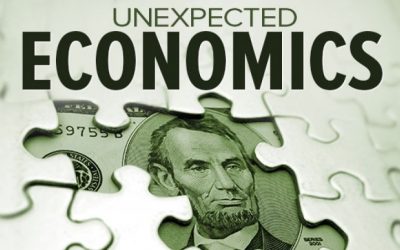🌟 New Year Offer 🌟
Celebrate 2026 with 30% OFF on all products! Use code: NEWYEAR2026. Hurry, offer ends soon!
Economics, 3rd Edition, will help you think about and discuss these and other economic issues that affect you and the nation every day—interest rates, unemployment, personal investing, budget deficits, globalization, and many more—with a greater level of knowledge and sophistication.
Timothy Taylor, M.Econ – Economics, 3rd Edition

We are all economists—when we work, buy, save, invest, pay taxes, and vote. It pays us back many times over to be Good economists. Every day economic issues are present in our lives. When economics is brought up in conversation, or on the news, it can be difficult to grasp the basics of economics.
- How can I get a comprehensive overview of the entire U.S. Economy?
- Why is budget deficit important?
- What does the Federal Reserve do exactly?
- Why is international trade so strongly supported by economists?
Economics, 3rd Edition, will help you think about and discuss these and other economic issues that affect you and the nation every day—interest rates, unemployment, personal investing, budget deficits, globalization, and many more—with a greater level of knowledge and sophistication.
This is for those who have not yet purchased our 2nd product. Edition Economics course, this enlarged & reorganized 3rd Edition Includes updated statistics and discussion on recent events. It also includes expanded coverage in areas that are of great public interest, like anti-Trust issues, corporate responsibility and international financial crashes.
Learn the basics of economics
These lectures do not require advanced or special knowledge of mathematics. Instead, you will learn economics from an instructor who has received teaching awards at Stanford University and the University of Minnesota.
Professor Timothy Taylor’s 18 first lectures are focused on “microeconomics,” Looking at economics “from the bottom up.” You will learn about the behavior of individuals, households and firms, as well as how they interact with each other in markets for goods, labor and saving and investment. Microeconomic topics include:
- How does supply-demand work in the free market to determine prices for the goods we buy and the wages we get?
- How are interest rates calculated? And what effects do they have on so many decisions we make—such as what house we will buy?
- How can businesses compete against each other? What is a natural monopoly? What role does government play in encouraging and regulating competition
- Definition “public goods”—things like national defense and education—that we all benefit from whether we contribute to them or not. The prisoner’s dilemma, a game theory problem, can help us understand the difficulty of encouraging citizens support production of public good.
The second half of this course covers “macroeconomics,” Or studying the economy “from the top down.”This section will discuss the factors that aid economists in evaluating the economy on both a global and national scale. These macroeconomic issues are:
- Common ways that the government taxes and spends money, and how these actions impact the total demand and supply of our economy
- The relationship between employment and inflation, and the different perspectives on this problem advanced by the two main schools of economic theory—the Keynesians and the neoclassicists
- International economics: What are the arguments in favor and against international trade? How are exchange rate determinations made and what does this mean for individuals and the economy as a whole? What are the future prospects for the global economy—which nations are likely to do well and which will lag behind?
Professor Taylor will help you apply the knowledge you have gained to some of today’s most commonly discussed and misunderstood topics. Is the world economy truly globalized? Does this mean that American workers are losing their jobs due to globalization? Why are markets for health and car insurance so expensive and controversial? What are our chances for avoiding the Social Security or healthcare crises?
Learn how to think like an economist
John Maynard Keynes was once a top economist of the 20th century. “Economics is a method rather than a doctrine, an apparatus of the mind, a technique of thinking which helps its possessor to draw correct conclusions.”
You will discover that economics is fundamentally a way to think about the big problems facing our society and that economists can sometimes think differently than the rest of us about these issues. You will learn how to think like an economist on a variety of topics that are featured in the news almost every day.
- Is it realistic to see pollution as a moral problem and to try to eradicate it completely? Can pollution have any benefits? What would we have give up if we wanted to eradicate all pollution?
- How should the government decide whether to block a corporate merger?
- Should rents be controlled so that people can afford housing? Or should the government subsidize low-income housing?-Income housing or rent vouchers for families? Which strategy would an economist prefer? Which strategy would an economist most likely choose for his or her career?
These lectures will show you the difficulties of formulating economic policies that work. satisfying to everyone—consumers and businesses, Republicans and Democrats, rich and poor.
Economics everywhere: From cowrie shells to Edison, Mohair to Mickey Mouse
Economics is not just about numbers. It’s also about politics, psychology and history, as well as inventions and many other aspects. It is full of interesting, surprising, and amusing content. These are just a few of the many examples.
- The first invention of Thomas Edison was an automatic vote.-Machine for counting. He realized he couldn’t sell it and decided to make invents that people would want.
- The idea of using a “basket of goods” It takes a long time to measure inflation. Massachusetts paid its soldiers the money to buy the following goods during the Revolutionary War: 5 bushels of corn; 68; and four-Sevenths pounds of beef, 10lbs of wood, and 16lbs of leather.
- The federal minimum wage law was first passed in 1938. It was meant to keep jobs in the northern United States from being transferred to the southern United States, where wages are much lower. It deliberately placed millions of low-wage workers.-South-based skilled black workers are out of work.
- The cowrie shell was the money item that served the most geographical areas and lasted the longest. It was in use since 700 B.C. It was first used in China, then it was adopted in India, Africa, as well as southern Europe. It was acceptable to pay taxes in some African countries well into 20th century.
- It is often misused to argue that a product should not be imported because it is essential to national security. In the 1950s, the American mohair industry successfully argued for protection—which exists to this day—on the basis that military uniforms contained mohair and without support for the industry American soldiers risked going to battle naked.
In other lectures, you will learn how various ways to measure and analyze the economy were first developed—for example, how America’s first statistical definition of poverty was formulated by one person, Social Security Administration employee Mollie Orshansky, in the 1960s. Professor Taylor walks you through the intricate details of patents and copyrights. He also discusses product advertising. Even behavior that isn’t related to economics can be applied to economic analysis, such as why many Americans don’t vote.
Be an Economics Conversation Starter. Or stopper.
If you take this course and pay attention to its content, you will be able hold your own when economics is discussed at work or at the dinner table.
If you hear someone say, for example, “A tax on gas could be a good way of encouraging people to drive less,” You’ll be able add, knowingly “Perhaps, but of course, it all depends on the elasticity of demand for gasoline.”
“I should warn you though,” Professor Taylor said, based on personal experience, “that comments like this can either lead to a really much more intelligent and informed conversation, or they can lead the conversation to an abrupt and uncomfortable halt.”
Please note:
This course is not intended as investment or financial advice. All investments come with risk. Past performance is not indicative of future success. You agree to not rely on any information contained in this course.
Read more: http://archive.is/ltLLO
Course Features
- Lecture 0
- Quiz 0
- Duration Lifetime access
- Skill level All levels
- Students 281
- Assessments Yes


